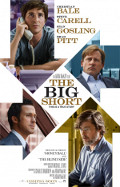
Directed by
Adam McKay
130 minutes
Rated M
Reviewed by
Chris Thompson

Big Short, The
Synopsis: In 2005, an eccentric (with just a touch of Aspberger’s) money manager, Dr Michael Burry (Christian Bale), studies thousands of individual loans and makes a startling discovery: the market is loaded with delinquent home loans that are certain to default in the next couple of years. When his warnings of financial disaster are ignored, Burry plans to “short” the booming market to prove a point and make a fortune. When Jared Vennett (Ryan Gosling) a mid-level Wall Street banker catches wind of Burry’s strategy, he persuades a hedge-fund manager, Mark Baum (Steve Carell) to follow Burry’s lead. Meanwhile, banker-turned-environmental-doomsayer Ben Rickert (Brad Pitt) is drawn into the scheme by John Magaro (Charlie Geller) and Jamie Shipley (Finn Wittrock), two young money managers hoping to make their mark on Wall Street.
The 2007-2008 Global Financial Crisis is proving to be fertile ground for movie makers, going back to Charles Ferguson’s excellent 2010 doco, Inside Job and John Wells' The Company Men (2010), followed by J.C.Chandor’s outstanding Margin Call ( 2011) and this year’s gripping 99 Homes, directed by Ramin Bahrani (okay, there was also Michael Winterbottom and Russell Brand’s ham-fisted The Emperor’s New Clothes but let’s just skip over that).
This latest entry to the fold is set in the lead-up to the G.F.C. and is based on a series of simultaneous stories that describe the events and the actions of individuals that are so audaciously arrogant, avaricious or just plain gob-smackingly stupid that, as with Margin Call and 99 Homes, they can only properly be told as gripping thrillers or as shockingly funny black comedies. The brilliance of this film is that it opts for the latter and still manages to create scenes that make us feel the same nausea as those thrillers when we realise the enormity of what’s happening and how that is about to impact on us all.
The screenplay is based on Michael Lewis’s bestseller of the same name. He’d previously written the books upon which The Blind Side (2009) and Moneyball (2011) were based so right away we know that we’re in good hands. The surprise for me, though, is that a film so stylistically accomplished with such a sophisticated balance between its dark comedy and dramatic undertones comes from a writer/director whose filmography includes a string of competent but fairly predictable Will Ferrell comedies such as Anchorman (2004), Anchorman 2 (2013), Stepbrothers (2008) and The Other Guys (2010). (But then, I guess he did also write this year’s Ant-Man which is arguably the funniest and most original of the recent releases from the Marvel movie universe).
With this film McKay really steps it up a big notch hitting all the right marks in terms of character, plotting and the interweaving of these separate but interconnected stories. His most important achievement, however, is in his filmic style which is anything but run-of-the-mill. The almost insurmountable problem with stories set in the world of finance on this scale is trying to explain to the audience what the hell is actually going on. What are CDOs or tranches or sub-prime loans and what does it mean to short the market? McKay’s solution to this is ingenious. At key moments throughout the film, Vennett (who speaks directly to camera throughout as he relates the events to us) acknowledges the incomprehensible nature of some of these concepts and to assist us offers a series of break-out moments where the terms and mechanisms are explained in more palatable ways; firstly with Margot Robbie in a bubble-bath, then with Anthony Bourdain in his restaurant (an hilarious explanation of on-selling bad debt using fish as an example) and finally Selena Gomez in a casino demonstrating the ludicrous outcomes of betting on the outcome of other people’s bets. Whilst I still can’t exactly explain how a subprime loan works, Margot, Anthony and Selena gave me enough of an inkling that I was able to follow the very convoluted story.
As funny as this film is, it is also deadly serious and there are moments when we catch our breath at what we’ve just been laughing at. In one scene, Vennett uses a Jenga Tower (wooden blocks stacked one upon the other and then removed one at a time) to make a point. It’s a clever visual metaphor and later, when that metaphoric collapse is about to happen, Rickert stops his two young protégés who are preparing to celebrate their win from the world’s loss and looks them both in the eye; “You know what you just did? You bet against the American economy.” And suddenly we’re not laughing anymore.
The characters are all equally strong and distinctive from a uniformly great cast, albeit a very blokey one. Marisa Tomei as Baum’s wife and Melissa Leo as a Goldman Sachs executive both give excellent performances but with such small roles can’t swing the balance back much. But then, this was a bunch of greedy white men in a testosterone-laced male world that brought us all to the brink. And the heroes of this story are another bunch of white men who are pissed off with the greedy men and set out to stick it to them and in doing so make their own very big pile of cash. There are really no good guys here.
The Big Short opens with a Mark Twain quote – “It ain’t what you don’t know that gets you into trouble. It’s what you know for sure that just ain’t so.” That just about sums it up.

Want more about this film?


Want something different?




